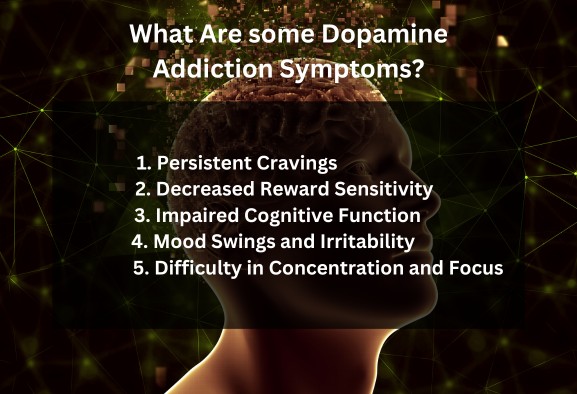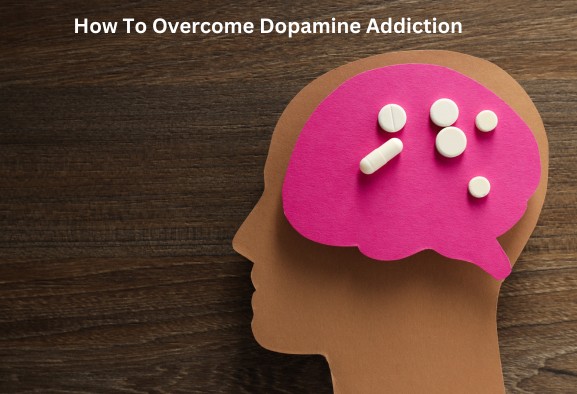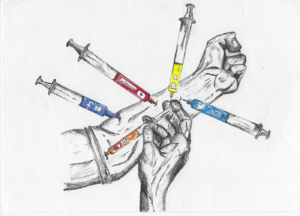The neurotransmitter dopamine, which is linked to reward and pleasure, has gained popularity in conversations about addiction. Can You Be Addicted to Dopamine?
Let’s investigate this fascinating question and the complex relationship between this pleasurable chemical and our brain.
What is Dopamine?
Dopamine, often hailed as the “feel-good” neurotransmitter, contributes to a myriad of functions within the brain. From regulating mood to influencing motivation, it serves as the driving force behind our behavioral responses.
Dopamine operates within specific neural pathways, creating a network that spans various brain regions. The mesolimbic path, often called the brain’s reward system, is particularly significant in understanding how dopamine influences behavior.
When we encounter pleasurable stimuli, such as delicious food or a rewarding experience, dopamine is released in the nucleus accumbens, a key component of the reward system. This surge in dopamine creates a sense of pleasure and reinforces the likelihood of repeating the behavior that led to its release.
What is Dopamine Addiction?
The term “dopamine addiction” can be misleading. Dopamine itself is not an addictive substance like a drug or alcohol. However, dopamine does play a significant role in addiction, and behaviors that trigger excessive dopamine release can become addictive.
Dopamine Addiction, a captivating yet perilous phenomenon, emerges when the brain becomes excessively reliant on the euphoric sensations triggered by this neurotransmitter. A complex interplay of pleasure-seeking behaviors can lead to detrimental consequences.
Check out our latest blog on What Is Addiction?
What Are some Dopamine Addiction Symptoms?

Dopamine addiction can manifest in various ways, affecting both mental and physical well-being. Here are some key symptoms to be aware of:
Persistent Cravings:
One of the primary indicators of dopamine addiction is the persistence of cravings. Individuals addicted to the dopamine rush often find themselves constantly seeking activities that trigger its release, such as excessive social media use, gaming, or substance abuse.
Decreased Reward Sensitivity:
As addiction progresses, the brain’s reward system can become desensitized. It means that activities once found enjoyable may no longer bring the same level of satisfaction, pushing individuals to intensify their addictive behaviors in search of that elusive dopamine boost.
Impaired Cognitive Function:
Dopamine addiction can take a toll on cognitive function. Difficulty in concentration, memory lapses, and impaired decision-making are common symptoms. These cognitive challenges can affect personal and professional aspects of an individual’s life.
Mood Swings and Irritability:
Fluctuations in mood, ranging from euphoria during dopamine-releasing activities to irritability during withdrawal periods, are telltale signs of addiction. The emotional rollercoaster associated with dopamine addiction can strain relationships and hinder emotional well-being.
Difficulty in Concentration and Focus:
Dopamine plays a crucial role in cognitive functions. Individuals battling addiction may find it challenging to concentrate or maintain focus, affecting their productivity and overall cognitive performance.
How to Manage Dopamine Levels?
Managing dopamine levels becomes essential for preserving mental health as we navigate the complexity of contemporary life.Let’s look at some doable tactics to support a balanced dopamine release strategy:
Regular Exercise:
Physical activity is a potent catalyst for dopamine release. Engaging in regular exercise not only promotes overall health but also contributes to a steady and balanced amount of dopamine. Whether it’s a brisk walk, a workout session, or a recreational sport, incorporating physical activity into your routine can positively impact dopamine levels.
Mindful Pursuit of Hobbies:
Cultivating hobbies that bring joy and fulfillment can be a constructive way to manage dopamine levels. Whether painting, playing a musical instrument, or engaging in a creative pursuit, these activities offer a natural and rewarding dopamine release.
Social Connections:
Human connection is a powerful influencer of dopamine release. Nurturing meaningful relationships and engaging in social activities can provide a sense of connection and belonging, positively impacting dopamine levels. It can be as simple as spending quality time with friends or participating in community events.
Balanced Media Consumption:
Being aware of the media content you consume is essential in a time when digital stimuli are all around you. Reducing the time spent on screens, especially on social media sites meant to release dopamine, can support a more balanced lifestyle. Resetting your device by unplugging it from time to time helps avoid overstimulation.
Nutritional Considerations:
Certain foods can influence dopamine production. Incorporating a balanced diet with adequate protein, tyrosine-rich foods (a precursor to dopamine), and essential nutrients supports optimal neurotransmitter function. Consultation with a nutritionist can provide personalized dietary recommendations.
Acknowledging the potential pitfalls of dopamine-related behaviors is the first step towards breaking free from unhealthy habits. Discovering alternative, positive sources of pleasure and rewiring our brains to seek fulfillment in healthier avenues is essential for overcoming the allure of dopamine-driven addictions.
Check out the latest blog on How Long To Rewire Brain From Addiction?
Now, Can You Be Addicted to Dopamine?
While dopamine itself may not be directly addictive, certain activities or substances that trigger its release can become habit-forming. From excessive gaming to substance abuse, these behaviors can hijack the brain’s reward system, creating a cycle that resembles addiction.
Dopamine helps solidify memories of pleasurable experiences, making us seek them out again. Over time, repeated engagement in addictive behavior can alter the reward system, leading to cravings, tolerance, and withdrawal symptoms.
Conclusion
Dopamine is a key neurotransmitter that shapes our experiences and behaviors through complex dance through the brain’s neural pathways. Even though research on dopamine addiction is still in its early stages, promoting mental health requires knowing the warning signs and leading a balanced lifestyle.
For those seeking a comprehensive approach to break free from Dopamine Addiction, All American Detox emerges as a beacon of hope. This cutting-edge detoxification center combines expert guidance with personalized programs, addressing the root causes of addiction for sustainable recovery.





